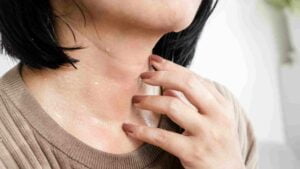Embarking on the journey of a hysterectomy is a significant and often life-altering decision for many women. While this surgical procedure can bring relief from various health issues, it may also usher in a new set of challenges, with hot flashes being a common postoperative concern. These sudden and intense waves of heat can disrupt daily life and impact overall well-being. In this blog, we will explore the causes and range of treatments for hot flashes after hysterectomy to help you find relief and regain control over your comfort.
Contents
What Causes Hot Flashes After Hysterectomy?
 Hot flashes after a hysterectomy can be attributed to hormonal changes, particularly a sudden drop in estrogen levels. The removal of the uterus, and sometimes the ovaries, during a hysterectomy can induce a state of surgical or induced menopause. Here are the key factors contributing to hot flashes after a hysterectomy:
Hot flashes after a hysterectomy can be attributed to hormonal changes, particularly a sudden drop in estrogen levels. The removal of the uterus, and sometimes the ovaries, during a hysterectomy can induce a state of surgical or induced menopause. Here are the key factors contributing to hot flashes after a hysterectomy:
- Hormonal Fluctuations: The sudden decrease in estrogen levels triggers a disruption in the body’s thermoregulatory mechanisms. This hormonal imbalance can lead to the characteristic sensation of intense heat and sweating associated with hot flashes.
- Surgical Menopause: If the ovaries are removed during the hysterectomy (oophorectomy), this results in an abrupt and permanent cessation of estrogen production. Surgical menopause, as opposed to natural menopause, brings about a more immediate and pronounced hormonal shift, contributing to the onset and severity of hot flashes.
- Individual Variations: Each woman’s body reacts differently to hormonal changes. Some women may experience hot flashes more intensely and frequently than others.
- Age at Hysterectomy: The age at which a woman undergoes a hysterectomy can impact the experience of hot flashes. Younger women may have a more pronounced reaction due to the sudden loss of estrogen, whereas older women may already be approaching natural menopause, potentially experiencing a smoother transition.
- Psychological and Emotional Factors: Stress, anxiety, and emotional factors can exacerbate the frequency and intensity of hot flashes. The mind-body connection plays a role in the manifestation of menopausal symptoms, and managing stress can positively influence symptom severity.
Understanding these underlying causes is crucial for developing effective strategies to manage hot flashes after a hysterectomy. Women experiencing post-hysterectomy symptoms should consult with their healthcare provider to explore personalized treatment options.
What Are Some Treatments For Hot Flashes After Hysterectomy?
 There are several medical treatments for hot flashes after hysterectomy available. It’s important to note that the choice of treatment depends on individual health considerations and should be discussed with a healthcare professional. Here are some medical treatments commonly used to alleviate hot flashes:
There are several medical treatments for hot flashes after hysterectomy available. It’s important to note that the choice of treatment depends on individual health considerations and should be discussed with a healthcare professional. Here are some medical treatments commonly used to alleviate hot flashes:
Hormone Replacement Therapy (HRT)
Hormone Replacement Therapy involves the administration of estrogen, sometimes in combination with progestin. This treatment aims to address the hormonal imbalance resulting from the removal of the uterus and ovaries during a hysterectomy. By supplementing the body with the hormones it no longer produces in sufficient quantities, HRT can effectively alleviate hot flashes. However, the decision to undergo HRT should be made in consultation with a healthcare professional, as it carries potential risks, including an increased risk of certain health conditions such as breast cancer and blood clots.
Selective Estrogen Receptor Modulators (SERMs)
Selective Estrogen Receptor Modulators, such as raloxifene and tamoxifen, are medications originally designed for the prevention and treatment of breast cancer and osteoporosis. These drugs work by selectively modulating estrogen receptors in the body, providing relief from hot flashes. While not as commonly prescribed as HRT, SERMs offer an alternative for women who may have contraindications or concerns about traditional hormone therapy.
Gabapentin and Pregabalin
Originally developed to treat seizures and nerve pain, gabapentin and pregabalin have demonstrated effectiveness in reducing the frequency and intensity of hot flashes. These medications are believed to impact the central nervous system, helping to regulate body temperature. They are particularly considered for women who cannot or prefer not to use hormonal treatments, offering a non-hormonal option for managing menopausal symptoms.
Clonidine
Clonidine, initially a medication for high blood pressure, is effective in reducing hot flashes. It works by affecting the central nervous system and may be prescribed in the form of oral tablets or patches. While not specifically designed for managing menopausal symptoms, clonidine provides an alternative for women who cannot tolerate hormonal therapies or prefer non-hormonal interventions.
Antidepressants (SSRIs/SNRIs)
Certain antidepressants, including selective serotonin reuptake inhibitors (SSRIs) and serotonin-norepinephrine reuptake inhibitors (SNRIs), have demonstrated efficacy in reducing hot flashes. Medications such as venlafaxine and paroxetine, commonly used to treat depression and anxiety, can provide relief by modulating neurotransmitters in the brain. This class of drugs is considered for women who may benefit from both mood stabilization and reduction of menopausal symptoms.
Brisdelle (Paroxetine Mesylate)
Brisdelle is a medication specifically FDA-approved for the treatment of hot flashes. It is a low-dose form of the antidepressant paroxetine. This option is tailored to women experiencing menopausal symptoms who may not be suitable candidates for traditional hormone therapy. Brisdelle provides an alternative with a focus on managing hot flashes and improving the overall quality of life during the post-hysterectomy period.
Overall, individuals need to consult with their healthcare provider to determine the most appropriate and effective treatments for hot flashes after hysterectomy. The choice of medication may depend on factors such as overall health, medical history, and personal preferences.
What Helps Hot Flashes Go Away Naturally?
 Managing hot flashes naturally involves making lifestyle adjustments and incorporating practices that may help alleviate symptoms. While individual responses vary, the following strategies have been reported to help reduce the frequency and intensity of hot flashes:
Managing hot flashes naturally involves making lifestyle adjustments and incorporating practices that may help alleviate symptoms. While individual responses vary, the following strategies have been reported to help reduce the frequency and intensity of hot flashes:
Maintain a Healthy Diet
Include a well-balanced diet rich in fruits, vegetables, whole grains, and lean proteins. Limiting the intake of spicy foods, caffeine, and alcohol may also help in reducing the occurrence of hot flashes.
Stay Hydrated
Adequate hydration is essential. Drink plenty of water throughout the day to help regulate body temperature. Carry a water bottle to stay hydrated, especially during warmer weather.
Regular Exercise
Engage in regular physical activity, such as walking, swimming, or yoga. Exercise can help regulate hormones and contribute to overall well-being. Consult with a healthcare provider before starting a new exercise routine.
Cooling Techniques
Use cooling techniques to manage body temperature, such as wearing lightweight, breathable clothing, using fans, and keeping the living environment at a comfortable temperature. Cool packs or cold compresses may also provide relief when applied to the wrists or neck during a hot flash.
Stress Management
Practice stress-reducing techniques like deep breathing, meditation, or mindfulness. Stress can trigger hot flashes, and managing stress may help minimize their occurrence.
Acupuncture
Some women find relief from hot flashes through acupuncture. This traditional Chinese medicine involves the insertion of thin needles into specific points on the body to restore balance and promote overall well-being.
Herbal Supplements
Certain herbal supplements, like black cohosh and red clover, have been traditionally used to alleviate menopausal symptoms, including hot flashes. It’s crucial to consult with a healthcare provider before using any herbal remedies, as their safety and efficacy can vary.
Maintain a Consistent Sleep Schedule
Ensure adequate and restful sleep by maintaining a consistent sleep schedule. Create a calming bedtime routine, and consider making the sleeping environment cool and comfortable.
Dress in Layers
Dress in layers to easily adjust to temperature changes. This allows for quick adaptation during hot flashes by removing outer layers when needed.
Mindfulness and Relaxation Techniques
Practice mindfulness-based stress reduction or relaxation techniques. Techniques such as guided imagery, progressive muscle relaxation, and biofeedback may help manage the frequency and severity of hot flashes.
It’s important to remember that natural remedies may not work for everyone, and individual responses vary. Consulting with a healthcare provider is crucial to ensure that these approaches are safe and appropriate for your specific health condition. Additionally, if hot flashes persist or significantly impact your quality of life, medical interventions may be considered under the guidance.
Do Hot Flashes Ever Stop After Hysterectomy?
 Following a hysterectomy, the resolution of hot flashes varies among women, and the timeline can differ significantly. In many cases, women experience a gradual reduction in the frequency and intensity of hot flashes over time. The body undergoes an adjustment period as it adapts to the hormonal changes triggered by the removal of the uterus and, if applicable, the ovaries. For some women, hot flashes may cease altogether within a few months to a couple of years post-surgery as the hormonal fluctuations stabilize.
Following a hysterectomy, the resolution of hot flashes varies among women, and the timeline can differ significantly. In many cases, women experience a gradual reduction in the frequency and intensity of hot flashes over time. The body undergoes an adjustment period as it adapts to the hormonal changes triggered by the removal of the uterus and, if applicable, the ovaries. For some women, hot flashes may cease altogether within a few months to a couple of years post-surgery as the hormonal fluctuations stabilize.
However, it’s important to note that individual responses to a hysterectomy can vary based on factors. Such as age, overall health, and whether the ovaries were removed. Younger women may experience a more abrupt onset of menopausal symptoms, including hot flashes. Conversely, women who were nearing natural menopause before the hysterectomy may find that their symptoms were already diminishing, and the surgery accelerates this process.
It’s advisable for individuals experiencing persistent or bothersome hot flashes to consult with their healthcare provider to explore personalized treatment options. Thus, ensure proper management of post-hysterectomy symptoms.
Conclusion
In conclusion, treatments for hot flashes after hysterectomy involve a combination of lifestyle adjustments and, if needed, medical interventions. From understanding the hormonal changes causing hot flashes to exploring various treatments such as hormone replacement therapy, medications, and natural remedies like exercise and stress management, there are diverse approaches to finding relief.
It’s essential to work closely with healthcare providers, discuss individual needs, and make informed decisions based on personal health considerations. With a tailored plan that may include both natural strategies and medical treatments, women can navigate the post-hysterectomy period with a focus on regaining comfort and overall well-being. If you are facing menopause-related issues, menopause treatment at HerMantra can help. Book your free trial online menopause treatment session now.


